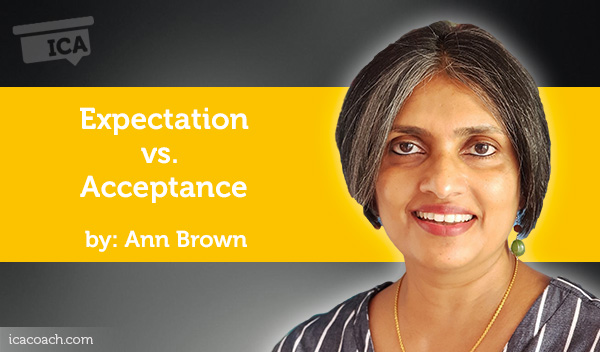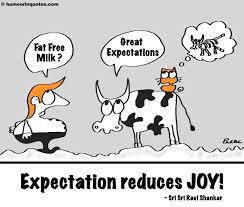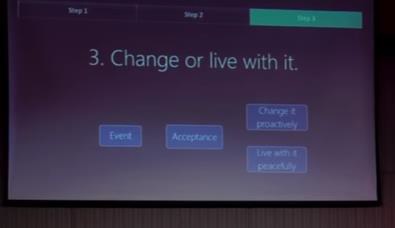
A Coaching Power Tool Created by Ann Brown
(Life & Executive Coach, NEW ZEALAND)

Expectation is a concept that gets embedded in us at a very early age. Quite often, as we grow up, we hear our parents or teachers expecting us to do certain things. Some examples are that it is expected that we eat our dinner, make our beds, be kind to other people……and the list goes on. However, the reality is that even from the day we are born some of these expectations may never materialise. If we rely on meeting expectations of others and ourselves as a way of finding joy, we are handing over the steering wheel of our life to someone else. Instead, if we accept the way we are and the curve balls in life that challenge us and not be attached to the outcome, we can respond to the external environment in a way that helps us grow from the experience, stay balanced in our responses by staying in the driver’s seat and experience peace and calm along the journey.
What is expectation?
Your expectations are your strong hopes or beliefs that something will happen or that you will get something that you want. Collins dictionary definition
This definition tells us that this concept is attached to an outcome of getting something. This means that if you do not get the outcome it can lead to disappointment, hurt, blame and a feeling of powerlessness. Expectation does not guarantee you anything. This does not, however, mean that you don’t try hard and don’t try to achieve goals due to the fear of not getting the desired outcome. Instead we can explore a different perspective of staying true to our goal confidently to the very best of our ability without attaching ourselves to the outcome. An example is when filling a balloon to its full capacity, it makes it a delightful decoration of joy, however, if you overfill it, it cannot cope and will burst causing a painful noise and a feeling of loss. Comparing this with humans, an appreciation of our limits by being self-aware and being confident and detached from the outcome will give us hope (not expectation) and joy.
What is acceptance?
The Cambridge dictionary refers to acceptance as a general agreement that something is satisfactory or right. It is about our approach to reality.
Our approach to reality is not necessarily aligned to our expectation. As we are more aware of our abilities and our limits we can close the gap to make progress. Acceptance, on the other hand is not inaction or an excuse to be lazy. If we battle with self-talk based on expectations (and not reality) this can cause a feeling of stagnation or loss. We reduce our gap between expectations and reality with acceptance thereby reducing conflict and increasing our satisfaction with life and our happiness.
Albert Einstein mentioned that
Once we accept our limits we go beyond them.
Referring to TedTalk, https://www.youtube.com/watch?v=9KiUq8i9pbE
Why we’re unhappy — the expectation gap,
Nat Ware has the view that we are unhappy when our expectations of reality exceed our experiences. He refers to the Expectation Gap that are of three types based on: our imagination, the influences of those around us and our past experiences.
Battles between realities provide an opportunity to accept. This does not mean being passive and accepting things that you can change. Instead it means accepting things you have no control over, so you are not unhappy and dissatisfied.
Acceptance has many benefits:
Note the powerful slide shared in a TedTalk, Power of Acceptance, Dylan Woon on the choices we have https://www.youtube.com/watch?v=-mQKf3Fz5KA

Self-application
There are times in relationships at home and at work when unwittingly I found I had expectations based on my experience and my environment. I found that I struggled to understand what I needed to change to be happy as my expectations were not being met. By exploring this further I realised that the only thing I could really change was myself and my attitude. I grew to learn the power of acceptance. I found the relationship between the word “should” and the word “is” and realised the gap between my expectation and reality could be bridged by practicing mindfulness and reflection which led to acceptance and letting go. I had the power of choice. Expectation and disappointment are irrevocably intertwined as due to expectations we imagine different and better outcomes than reality.
When one’s expectations are reduced to zero, one really appreciates everything one does have- Stephen Hawking
Coaching application
Coaching scenarios that typically come up where application of this tool is relevant are:
By asking powerful questions to create self-awareness, the client becomes aware of what she can really change and what she can only influence. With new found appreciation the client can choose to be accepting by practicing techniques to understand this approach and find peace and happiness.
Some questions we can use to create this self-awareness of expectation Vs acceptance are:
Reflections:
Deep contemplation and understanding of these two concepts can go a long way in quietening the self-talk and finding peace and fulfilment to move ahead confidently in a self-assured manner.
Resources:
Nat Ware, TedTalk
Stephen Hawking
Albert Einstein
Collins Dictionary & Cambridge dictionary
Dylan Woon, TedTalk